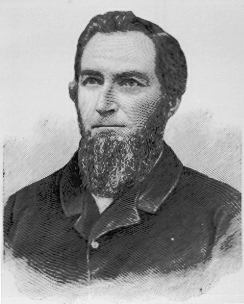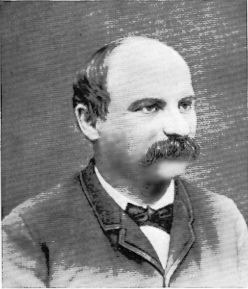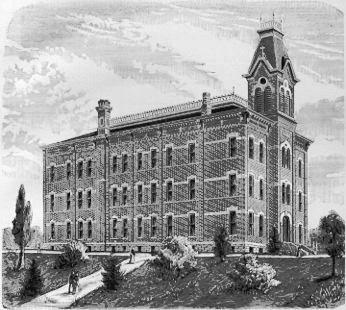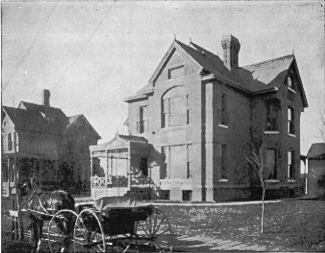|
OMAHA
ILLUSTRATED.
The
following year saw a still further increase in receipts and
a still further increase of consumption by the meat
manufacturers, as witness these totals:
|
|
RECEIPTS.
|
SHIPMENTS.
|
|
|

|

|
|
Cattle
|
148,515
|
89,476
|
|
Hogs
|
447,379
|
210,732
|
|
Sheep
|
41,490
|
22,943
|
|
[James
Creighton, a first cousin of Edward and John A.
Creighton, was among the early pioneers of Omaha.
He was born in Guernsey county, Ohio, March 1,
1822, the oldest of a family of six children. His
father was a superintendent of construction on the
national turnpike which was being built through
Ohio, under the internal improvement policy of
President Adams, and from this work the youthful
James acquired his first knowledge of public works.
With his father he continued in contract work of
this kind
|
|
until 1853. He had married in 1849, Sarah Ann
McCristal, who died in '53. Mr. Creighton then
engaged in the merchandise business until 1855,
when he married Eliza M. Largey, and moved to the
West, locating temporarily in Missouri, thence in
Iowa and finally in Omaha, May 26, 1856. Here he
entered upon land and engaged in farming. After
proving up on his claim he commenced the freighting
business, going to Denver that year with supplies.
In 1861 he was associated with Edward Creighton in
the building of the overland telegraph, having the
contract to deliver the poles for that section
lying between Ft. Laramie and Ft. Bridger. In
1862-3 he continned in the freighting business, his
trips across the plains, in 1863, making a total of
4,000 miles a great achievement in those days of
cattle trains. In 1863 an association was formed by
Edward, John A. and James Creighton and J. J. and
R. A. Brown, for the purpose of sending supply
trains to Alder Gulch, Montana, where the gold
excitement was dominant. Cattle trains were loaded
with merchandise and brought to the mines, the
trains returning with miners seeking their way back
to the States. In 1865 Mr. Creighton engaged in
contracting, and constructed a
|

JAMES CREIGHTON.
|
portion of the Union Pacific railroad. He
returned to Omaha on the death of his wife and from
that date remained permanently in Omaha. Mr.
Creighton has always been a man of marked
individuality and a foremost citizen in Omaha's
affairs. He was appointed to the first City Council
when Omaha incorporated, and was reelected a number
of terms. He was also a member of the State
Legislature of 1877, When the widow of Edward
Creighton died, leaving an estate of millions, Mr.
James Creighton, with John A. Creighton and Herman
Kountze, was named a trustee of the Creighton
college endowment and until the completion of that
structure his attention was largely devoted to the
project. In 1882 when Omaha entered upon its great
era of pnblic (sic) improvements, Mayor Boyd
selected Mr. Ceighton for chairman of the first
bonrd (sic) of public works, and it was during the
two years of his service in that capacity that
Omaha laid in its fine streets, the foundation of
its present metropolitan importance. So well did he
discharge his trust that a second term was tendered
him, but he declined, and again in 1887 the Mayor
pressed the appointment upon him, without avail.
Mr. Creighton is a man whose
|
|
idea of public duty, whose sense of right, was
never swerved by public opinion or selfish purpose.
He has been a leader of opinion in the city, and
his judgment in municipal matters has always been
consulted. He has by industry and honest effort
amassed a competency which he is enjoying in a
quiet way. Mr. Creighton married his present wife
in 1868, and has nine of fifteen children
living.]
|
It is seen that the receipts
of hogs were in 1886 nearly treble those of 1885, and that a
like proportion of consumption prevailed. But even great as
was the business done in 1886, that of 1887 surpasses it, as
is seen by this statement, given by months:
|
|
CATTLE.
|
|
HOGS.
|
|
|

|
|

|
|
|
RECEIPTS.
|
SHIPMENTS.
|
|
RECEIPTS.
|
SHIPMENTS.
|
|
January
|
10,912
|
7,246
|
|
62,647
|
814
|
|
February
|
12,430
|
7,431
|
|
56,569
|
2,010
|
|
March
|
20,480
|
13,327
|
|
86,121
|
15,082
|
|
April
|
15,265
|
7,557
|
|
64,547
|
5,332
|
|
May
|
22,288
|
13,957
|
|
86,841
|
5,755
|
|
June
|
19,376
|
12,747
|
|
119,594
|
37,426
|
|
July
|
15,705
|
9,356
|
|
93,912
|
21,380
|
|
August
|
22,923
|
14,610
|
|
93,441
|
25,622
|
|
September
|
34 046
|
24,953
|
|
78,338
|
6,589
|
|
October
|
32:483
|
22,970
|
|
52,093
|
4,989
|
|
November
|
20,252
|
14,109
|
|
137,591
|
14,333
|
|
December
|
13,103
|
5,901
|
|
153,840
|
18,348
|
|
|
-------
|
-------
|
|
-------
|
-------
|
|
Totals
|
229,263
|
154,164
|
|
1,186,534
|
157,680
|
[119]
|



